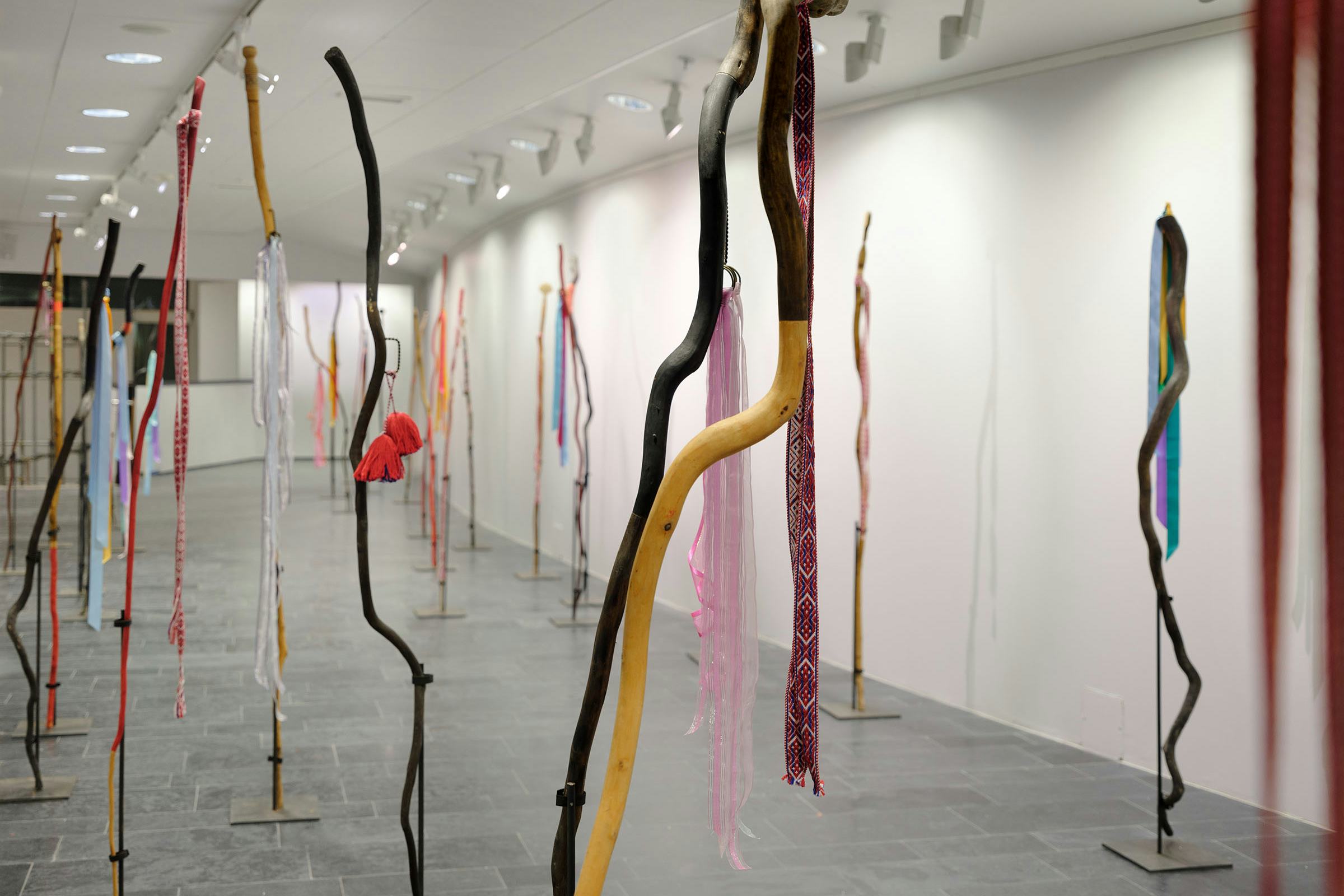LB°22 — Participants
ARKIVJenni Laiti (b. 1981) & Outi Pieski (b. 1973) are artists based in Finland and Sweden.
On view on at Konsthallen Kulturens Hus, Luleå
Ovdavázzit – Forewalkers, 2019 – ongoing
Painted, tared and carved birch tree, textile, silk ribbons, pattern ribbons and traditional woven ribbons, metal stick holders and brass ring decorations.
Ovdavázzit – Forewalkers is an installation conceived through a collaboration between Outi Pieski and Jenni Laiti. Displayed in two sinuous rows reconfiguring the walking path through the exhibition hallway of Luleå Konsthall, the work consists of 37 wooden sticks inspired by the Sámi walking sticks. Each stick is a unique piece of craft with carved marks and diverse forms of handles, each ringed with thin fabric. Paying homage to the artists’ Sámi ancestors and their forewalkers, the installation brings into dialogue the Sámi traditional handicraft, duodji, with contemporary art. The work follows the holistic understanding of duodji, as a handicraft tradition that is also an ancestral technology of community belonging that encodes knowledge of Arctic Sámi living.
In the Northern Sámi language, there are over 320 synonyms for walking, which attest to the millennium-old semi-nomadism of Arctic people. Ovdavázzit places the praxis of walking as a counterweight to the concept of border and as an act of self-determination.
Ovdavázzit – Forewalkers engages in the debates around land occupation and ownership especially in the current local struggles that the Sámi people face in their quest to preserve their Indigenous territory. The creation of colonial nation-states in the world during the past centuries have had a deep influence in the configuration of the current geopolitical climate. The pursuit of nation-building processes to implement uniformed and collective cultures have contributed to the scattering of different communities that have been grappling with the ongoing challenges of belonging to a collective identity and finding a space to maintain their own.
Colonial enterprises in land division and management have affected the Sámi people and the diversity of ecosystems in Sápmi, disrupting important activities such as reindeer herding, fishing, duodji, and others vital to their subsistence. In times of polycrisis, indigenous self-governance and the reciprocal life on the land, by the land, and for the land is a way to survive and thrive. Forewalkers pays a reminder that walking is the pace of the land and we should not go faster than the pace of the land.
Čiskke-Jovsset Biret Hánsa Outi, Outi Pieski (b. 1973, Helsinki, Sápmi/Finland) is a Sámi visual artist based in Ohcejohka/Utsjoki, Finland. Her paintings and installations delve into the Arctic region and the interdependence of nature and culture. Her work combines craft traditions as somatic and familial vocabularies to reopen intergenerational conversations about the Sámi people within discourses in the region of Sápmi. Pieski’s work raises questions around revitalisation, rematriation and actualisation of the larger biocultural reality of the Sámi people.
Outi Pieski holds a Master of Fine Arts from the Finnish Academy of Fine Arts in Helsinki, FI. Previous exhibitions include Tate St Ives, UK (2024), Gothenburg Biennial, SE (2023), Gropius Bau, GE (2022), Bonniers Konsthall, SE (2022), the Biennale of Sydney, AU (2022), Gwangju Biennale, KR (2021), and the 58th Venice Biennale, IT (2019).
Gánddáš-Sámmol Leinná Mihku Ilmára Jenni Unni Áile, Jenni Laiti (b. 1981, Enare, Sápmi/Finland) is an artist based in Jokkmokk, Sweden, who works with activism, installation, performance art and land-based community art. Positioned within the extensive legacy of Sámi duodji craftsmanship, Laiti serves as a crucial link in a millennium-long continuum, contributing to the perpetuation of Arctic Indigenous survival practices.
Jenni Laiti is a Duojár (Master of Traditional Sámi Crafts), an Indigenous Rights Activist, a Climate Justice Advocate, and has actively engaged with Sámi communities, advocating for Sámi self-determination and local governance, emphasising a commitment to crafting alternative futures.
